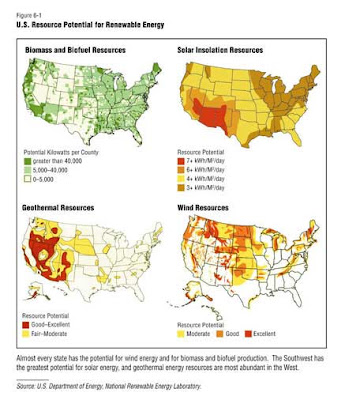NEW ENERGY: A GREAT QUESTION
Solar, wind and wave/tide/current energies are like national forests and public parks: They require and deserve incentives, for the common good. Nuclear energy is like a ski resort, popular as long as the attendant risk, liability and environmental harm are paid for by the public, but should the public pay those expenses? Oil & gas are like amusement parks, popular, costly and, up until recently, affordable. But upkeep is beginning to make tickets too expensive and there is less need for them when the public derives more value from national forests and public parks. Let those who want amusement parks pay the price.
U. S. incentives for renewable energy raise questions
Daniel Gross, May 27, 2007 (NY Times via International Herald Tribune)
WHO
Businesses and governments.
 opportunity everywhere (click to enlarge)
opportunity everywhere (click to enlarge)WHAT
The article raises the question of whether the incentives, mandates and subsidies driving investment in alternative energies amount to sound policy or bad economics.
WHEN
The incentives, mandates and subsidies have been, are being and will be used to encourage development of alternative energies. Examples: NYC will convert its city taxis to hybrids by 2012; President Bush called for the US to replace 20% of gasoline with ethanol by 2017.
WHERE
Federal government subsidies from Washington, D.C., renewable portfolio standards (RPS) for 20 states and city-sponsored incentives across the country reflect actions in the EU, Asia and around the world.
WHY
- The private sector, seeing the incentives, mandates and subsidies, is ramping up activity to get at the financial opportunities. But is this a market distortion, the economic basis of a bubble like the internet enthusiasms of the 1990s? Or the incentivizing of a new revolution (like the telegraph, the railroads, the Internet)? (Example: 85 ethanol projects will double capacity by 2008.)
- It may be a distortion NOT to incentivize renewable energies because they negate the social costs of carbon dioxide generating energy like coal and imported energy like oil & gas. Nevertheless, the incentives have the unintended consequence of driving prices up on other energies.
 States where Renewable Portfolio Standards (RPS) create an incentive to invest. (click to enlarge)
States where Renewable Portfolio Standards (RPS) create an incentive to invest. (click to enlarge)QUOTES
- Daniel Yergin, chairman, Cambridge Energy Research Associates: "There's a huge boom going on in alternative, renewable and new technologies, and it wouldn't be happening without the bouillabaisse of incentives, mandates, subsidies and the related group of ingredients…"
- Rayola Dougher, senior economic analyst, American Petroleum Institute: "We think a reliance on market forces is the best way to satisfy any growing fuel requirements, and that any policies should provide a level playing field for all options…We just don't think at this point that the government should pick winners and losers."
- Matt Hartwig, communications director, Renewable Fuels Association: “I equate the government support of ethanol to the government electrifying rural America or helping build the transcontinental railroads…The government helped set it up, and once it was there, the private sector took it over."
- John Urbanchuk, director, LECG: "The whole alternative energy sector is still an infant industry and competing against a well-established, well-capitalized petroleum industry…"








0 Comments:
Post a Comment
<< Home